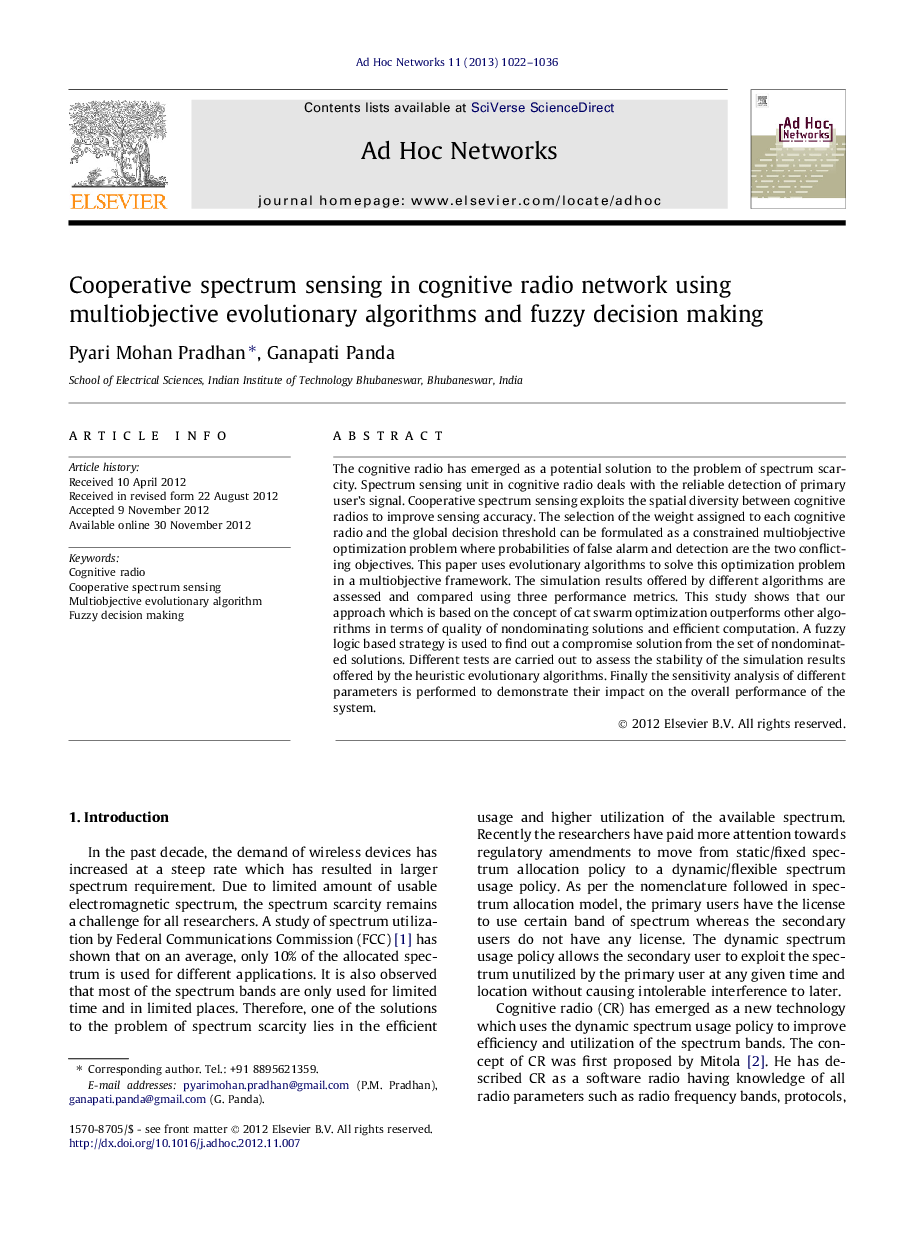| کد مقاله | کد نشریه | سال انتشار | مقاله انگلیسی | نسخه تمام متن |
|---|---|---|---|---|
| 10338048 | 693295 | 2013 | 15 صفحه PDF | دانلود رایگان |
عنوان انگلیسی مقاله ISI
Cooperative spectrum sensing in cognitive radio network using multiobjective evolutionary algorithms and fuzzy decision making
ترجمه فارسی عنوان
سنجش طیف تعاونی در شبکه رادیویی شناختی با استفاده از الگوریتم های تکاملی چند هدفه و تصمیم گیری فازی
دانلود مقاله + سفارش ترجمه
دانلود مقاله ISI انگلیسی
رایگان برای ایرانیان
کلمات کلیدی
رادیو شناختی، سنجش طیف تعاونی، الگوریتم تکاملی چند منظوره، تصمیم گیری فازی،
ترجمه چکیده
رادیو شناختی به عنوان یک راه حل بالقوه برای مشکل کمبود طیف به وجود آمده است. واحد سنجش طیف در رادیو شناختی با تشخیص قابل اطمینان سیگنال اولیه کاربر روبرو می شود. سنجش طیف تعاونی از تنوع فضایی بین رادیوهای شناختی برای بهبود دقت سنجش استفاده می کند. انتخاب وزن اختصاص داده شده به هر رادیوی شناختی و آستانه تصمیم جهانی، می تواند به عنوان یک مسئله بهینه سازی چند هدفه محدود شود، در حالی که احتمال زنگ هشدار و تشخیص نادرست دو هدف متضاد است. این مقاله از الگوریتم های تکاملی برای حل این مشکل بهینه سازی در یک چارچوب چند منظوره استفاده می کند. نتایج شبیه سازی شده توسط الگوریتم های مختلف ارزیابی و مقایسه شده با استفاده از سه معیار عملکرد. این مطالعه نشان می دهد که رویکرد ما که مبتنی بر مفهوم بهینه سازی گربه گربه است، از الگوریتم های دیگر از نظر کیفیت راه حل های نامفهومی و محاسبات کارآمد بهتر است. استراتژی مبتنی بر منطق فازی برای یافتن راه حل سازش از مجموعه ای از راه حل های غیرمنتظره استفاده می شود. تست های مختلف برای ارزیابی ثبات نتایج شبیه سازی شده توسط الگوریتم های تکاملی اکتشافی انجام شده است. در نهایت تجزیه و تحلیل حساسیت پارامترهای مختلف برای نشان دادن تأثیر آنها بر عملکرد کلی سیستم انجام شده است.
موضوعات مرتبط
مهندسی و علوم پایه
مهندسی کامپیوتر
شبکه های کامپیوتری و ارتباطات
چکیده انگلیسی
The cognitive radio has emerged as a potential solution to the problem of spectrum scarcity. Spectrum sensing unit in cognitive radio deals with the reliable detection of primary user's signal. Cooperative spectrum sensing exploits the spatial diversity between cognitive radios to improve sensing accuracy. The selection of the weight assigned to each cognitive radio and the global decision threshold can be formulated as a constrained multiobjective optimization problem where probabilities of false alarm and detection are the two conflicting objectives. This paper uses evolutionary algorithms to solve this optimization problem in a multiobjective framework. The simulation results offered by different algorithms are assessed and compared using three performance metrics. This study shows that our approach which is based on the concept of cat swarm optimization outperforms other algorithms in terms of quality of nondominating solutions and efficient computation. A fuzzy logic based strategy is used to find out a compromise solution from the set of nondominated solutions. Different tests are carried out to assess the stability of the simulation results offered by the heuristic evolutionary algorithms. Finally the sensitivity analysis of different parameters is performed to demonstrate their impact on the overall performance of the system.
ناشر
Database: Elsevier - ScienceDirect (ساینس دایرکت)
Journal: Ad Hoc Networks - Volume 11, Issue 3, May 2013, Pages 1022-1036
Journal: Ad Hoc Networks - Volume 11, Issue 3, May 2013, Pages 1022-1036
نویسندگان
Pyari Mohan Pradhan, Ganapati Panda,
